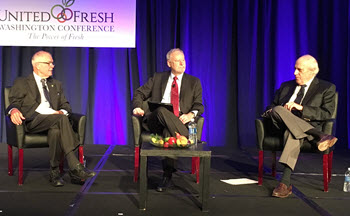WASHINGTON, Sept. 15, 2016 - Top executives of the leading biotech and chemical companies will face the Senate next week to defend their pending mega-mergers, including Bayer’s $66 billion deal announced yesterday to take over Monsanto.
The witness list for Tuesday’s Senate Judiciary Committee hearing includes Robb Fraley, chief technology officer of Monsanto, and Jim Blome, president and CEO of Bayer Crop Science North America.
Executives from Dow and DuPont and Syngenta CEO Erik Fyrwald also will be on the hot seat. Dow and DuPont are in the process of merging, and Syngenta is being taken over by ChemChina.
Senate Judiciary Chairman Chuck Grassley, R-Iowa, says the Bayer-Monsanto deal only increases the concerns that farmers already had about the impact of industry consolidation on input costs. The American Farm Bureau Federation’s chief economist, Bob Young, says the Justice Department needs to review the overall business climate that is giving rise to the mergers. Young also will be a witness at next week’s hearing.
Water projects bill set for vote with farm tank exemption. The Senate has cleared the way for a final vote today on a two-year water resources development bill that would authorize more than $12 billion for 29 Army Corps of Engineers projects in 18 states.
The largest of the projects would replace aging locks and dams on the upper Ohio River at a cost of $2.6 billion.
Nebraska Sen. Deb Fischer inserted a provision in the bill to provide relief to farmers from EPA regulations on fuel storage tanks. Her provision would exempt farms with storage tanks that have an individual capacity of 1,000 gallons or less, or an aggregate capacity of 2,000 gallons or less, from having to prepare a spill control plan. The exemption also would apply to storage containers for animal feed ingredients.
The House could take up its version of the bill next week.
CFTC nominees face Senate Ag. Nominees to fill the two vacancies on the Commodity Futures Trading Commission are likely to hear quite a bit today about considering the impact of regulations on farmers, grain companies and other end-users. The Senate Agriculture Committee is holding a confirmation hearing for the two nominees, Georgetown University law professor Chris Brummer and Brian Quintenz, a former House Republican adviser.
Committee Chairman Pat Roberts tells Agri-Pulse he’s been "favorably impressed" with the two nominees. Roberts says they came to private meetings with senators prepared to reassure them that they understood the importance of the futures market to farmers.
It doesn’t hurt that the CFTC under the chairmanship of Timothy Massad has also gone a long way in addressing concerns that the industry had about the bonafide hedging exemption and other issues. The commission is “very much aware of the risk management tools the farmers have to have and that the end user is not a swap dealer,” Roberts said.
Glickman: Clinton should pick Republican for USDA. Former Agriculture Secretary Dan Glickman says he’d like to see Hillary Clinton nominate a Republican to run USDA, if she’s elected. Glickman made the comment during a debate with former GOP Ag Secretary John Block before members of the United Fresh Produce Association yesterday. “Agriculture does tend to be bipartisan,” Glickman said.
Block needled Glickman a bit, saying at one point that if Glickman “hadn’t been so close to Hillary” he would probably have joined Trump’s agricultural advisory team.
Glickman said that voting for Clinton should be a no brainer for the produce industry because of her support for immigration reform and her interest in boosting nutrition standards. Block downplayed Trump’s campaign rhetoric on immigration and trade and talked up his support for tax reform and rolling back regulations.

Block, United Fresh President and CEO Tom Stenzel and
Glickman.
FDA has asked companies to voluntarily stop selling the drugs for growth promotion but has taken no steps to end the usage of antibiotics for prevention. The petition says more must be done to prevent overuse of antibiotics because growth-promotion uses account for only 10 to 15 percent of livestock antibiotic sales.
The drug industry’s trade group, the Animal Health Institute, says it would be “inhumane and unethical” to bar the use of the drugs for prevention when “clear disease threats exist.”
Majority of House back catfish repeal. Some 220 House members, a majority of the chamber, have signed onto a letter calling for a vote to shut down the catfish inspection program at USDA. The Senate has already approved a resolution to kill the rule that USDA needs to operate the program.
Importers have been trying for years to eliminate the program, which was originally authorized by the 2008 farm bill. The letter to House leaders say it makes no sense to have USDA inspecting catfish and FDA regulating all other forms of seafood.
He said it. “Ninety percent of the time what they say is what they think and what they mean.” - Agriculture Secretary Dan Glickman, on politicians.
Steve Davies contributed to this report.
#30
For more news, go to: www.Agri-Pulse.com

